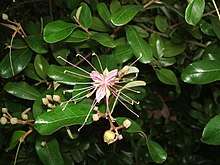Capparis cynophallophora
Capparis cynophallophora, commonly known as the Jamaican caper, is small tree in the caper family, Capparaceae, that is native to the neotropics.
| Jamaican caper | |
|---|---|
.jpg) | |
| Scientific classification | |
| Kingdom: | Plantae |
| Clade: | Tracheophytes |
| Clade: | Angiosperms |
| Clade: | Eudicots |
| Clade: | Rosids |
| Order: | Brassicales |
| Family: | Capparaceae |
| Genus: | Capparis |
| Species: | C. cynophallophora |
| Binomial name | |
| Capparis cynophallophora | |
Description
The brand new leaves at the apical tips of twigs are folded in half showing only the whitish, hairy abaxial (lower or ventral) side of the leaf. The adexical (upper or dorsal) side of the leaf is glossy and darker. Fruits are long and split to release several large, brown seeds.[2][3]
Habitat and range
The native range of C. cyanophallophora includes Florida in the United States, Mexico, the Caribbean, Central America, and South America as far south as northern Argentina.[1] It inhabits mangrove forests, hammocks and shellmounds in coastal Florida and is extremely drought resistant


References
- "Capparis cynophallophora". Germplasm Resources Information Network (GRIN). Agricultural Research Service (ARS), United States Department of Agriculture (USDA). Retrieved 2011-01-26.
- Wunderlin, Richard P. (1998). Guide to the Vascular Plants of Florida. Gainesville: University Press of Florida. p. 318.
- "A Self-Guided Walking Tour of Park Plants. John D MacArthur Beach State Park.
External links
![]()
![]()